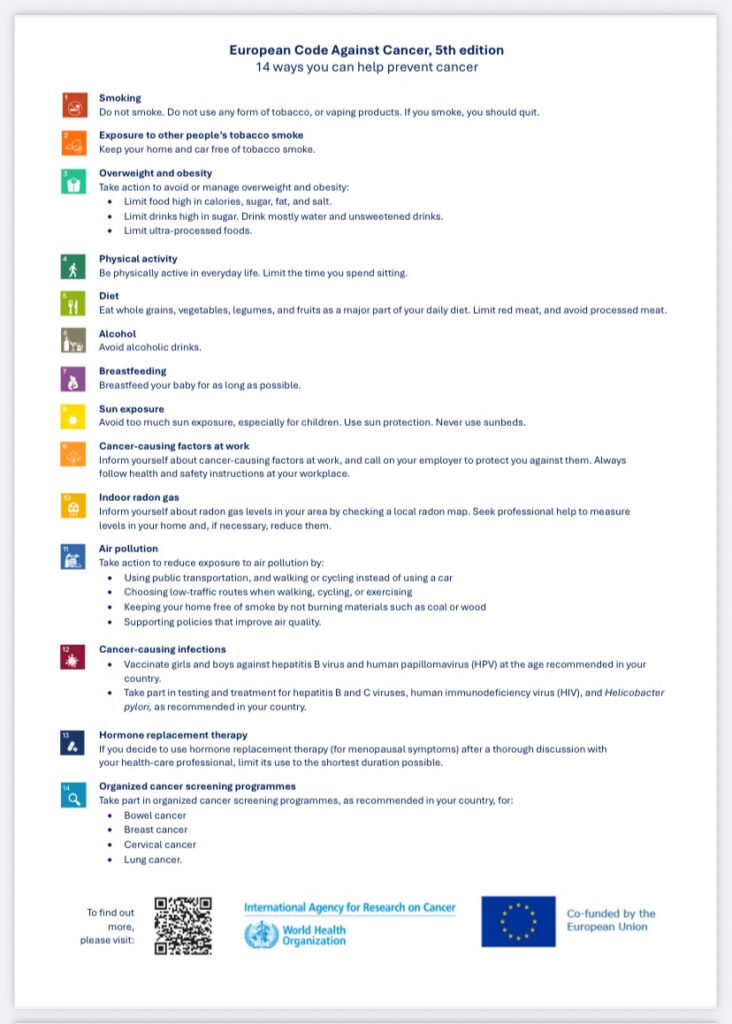Below are some links to news stories, fund-raising events, latest medical developments in the treatment of prostate cancer and much more:
10/11/25 – Hidden weakness makes prostate cancer self-destruct
Researchers found that prostate cancer relies on two enzymes, PDIA1 and PDIA5, for survival and drug resistance. Blocking these enzymes destroys the androgen receptor, kills cancer cells, and boosts the effectiveness of treatments like enzalutamide by also disrupting the cancer’s energy production. This discovery could lead to new strategies for overcoming therapy resistance in advanced prostate cancer.
23/10/25 – European Code Against Cancer
17/09/25 – Radiation Therapy
Radiation therapy uses high-energy particles to destroy cancer cells. For some people with early-stage prostate cancer, it can be a cure. In advanced cases, it may help relieve symptoms.
There are different types of radiation therapy, each with its own risks and benefits. Your doctor can help determine the best option for you and recommend ways to minimize side effects during and after treatment.
28/08/25 – Dermot Murnaghan calls for improved prostate cancer screenings as he details stage four diagnosis
Dermot Murnaghan, a former Sky News and BBC broadcaster aged 67, has urged for better prostate cancer screening programs, emphasizing that early detection, as in his own case, could reduce NHS costs in the long term. Diagnosed with stage four prostate cancer in June, where cancer has spread beyond the prostate, Murnaghan encourages men to request a PSA blood test and presses the government to provide screenings for high-risk individuals or those showing symptoms.
26/08/25 – Five early signs to watch out for
Prostate cancer begins in the prostate gland, which is part of the male reproductive system. It is one of the most common cancers in men and often develops slowly, sometimes without obvious symptoms. Because of its subtle progression, many men remain unaware of the disease until it has advanced to later, potentially life-threatening stages. Recognizing early warning signs can serve as crucial indicators of prostate cancer. Detecting the disease early allows for timely treatment, greatly improving health outcomes.
22/08/25 – Latest News, European Cancer Organisation
Every year, around 450,000 men in Europe are diagnosed with prostate cancer, and 107,000 lose their lives to the disease. The toll is not only personal but economic. Prostate cancer costs Europeans € 9 billion each year, with healthcare accounting for € 5.8 billion.
Three years ago, the Council of the EU updated its Cancer Screening Recommendations to include prostate cancer. Despite this, most European countries have yet to implement organised screening programmes. This delay is costing hundreds of thousands of lives.
The European Association of Urology, the European Cancer Organisation, Europa Uomo, and the Global Action on Men’s Health are calling on the EU to accelerate prostate cancer screening programmes in the EU Cancer Plan.
On European Prostate Cancer Awareness Day, #EPAD25, experts, policymakers, and patient representatives will explore how public policy can improve screening and early detection. Please join us at:
The European Parliament, Wednesday 3 September, 14:30-16:00 CEST.
Register your interest today.
Kind regards, Eduardo Veber
Communications Officer
European Cancer Organisation
Rue de la Science 41, 1040 Brussels, Belgium
Office telephone: +32 2 775 02 00
www.europeancancer.org
25/06/25 – Focal therapy can improve prostate cancer treatment by targeting specific areas and reducing risks like impotence or incontinence.
Two types of focal therapy are available:
High-intensity focused ultrasound (HIFU) is one of two types of focal therapy we offer. It uses ultrasound waves to target cancer in the lower, or posterior, part of your prostate. HIFU is a non-invasive treatment that is guided by advanced 3D MRI imaging to destroy cancer cells while protecting healthy tissues.
NanoKnife is the other type of focal therapy we offer and uses electrical pulses to target the upper, or anterior, part of your prostate. Guided by 3D MRI imaging, NanoKnife is a minimally-invasive treatment that destroys cancer cells that may be hard to reach with HIFU.
22/06/25 – Sir Chris Hoy backs call for overhaul of prostate cancer screening
The 49-year-old six-time Olympic champion has called for a major change to how men are tested for prostate cancer, following his diagnosis with terminal stage four of the disease.
NHS guidance typically identifies men over the age of 50 as being at the highest risk, but Sir Chris’s own battle at 47 underlines his urgent plea for earlier screening.
14/05/25 – What a Prostate Nodule Detection Like Biden’s Can Mean for a Man’s Health
Some doctors say they are surprised the condition was found at all in the former president, given his age.
Nodules are formed by inflammation and are usually benign, however, some can develop into cancer.
More here
16/04/25 – At-home Saliva Test For Prostate Cancer Better Than Blood Test
An at-home spit test appears to perform better at predicting prostate cancer risk than the current frontline test, a study suggests.
The test assesses 130 genetic variants to provide a risk score for prostate cancer, which is the second most common cause of cancer deaths in men in the UK.
This so-called polygenic risk score was found to be a more powerful predictor of aggressive prostate cancer than the standard blood test used in the NHS, which measures levels of a protein called prostate-specific antigen (PSA).
Prof Ros Eeles, who led the research at the Institute of Cancer Research, London, said: “With this test, it could be possible to turn the tide on prostate cancer. We have shown that a relatively simple, inexpensive spit test to identify men of European heritage at higher risk due to their genetic makeup is an effective tool to catch prostate cancer early.”
05/11/24 – Sir Chris Hoy Calls For Earlier Screening
From BBC website
The NHS will review whether to change its advice on testing for prostate cancer in light of Sir Chris Hoy’s “powerful” call for more younger men to be checked, the health secretary has said.
Olympic cycling champion Sir Chris, 48, has advanced cancer that has spread to his bones and is terminal.
In his first TV interview since announcing his condition, Sir Chris told BBC Breakfast how people with a strong family history should consider seeing their GP for PSA (prostate-specific antigen) blood test to help spot the disease.
PSA tests are not routinely offered to men under 50 without symptoms but who may be at risk. Doctors are instead told to use their judgement.
19/10/2024 – £1.5m AI Project
 A new project aims to help doctors predict whether a man’s prostate cancer will be aggressive at the point of diagnosis – giving him the best-targeted treatment before it spreads. A new £1.5 million research project harnessing artificial intelligence (AI) and cutting-edge genetic analysis hopes to do just that.
A new project aims to help doctors predict whether a man’s prostate cancer will be aggressive at the point of diagnosis – giving him the best-targeted treatment before it spreads. A new £1.5 million research project harnessing artificial intelligence (AI) and cutting-edge genetic analysis hopes to do just that.
A multidisciplinary team across the UK, led by Professor Ros Eeles at The Institute of Cancer Research, London, has collected data from blood and tumour samples belonging to 2,000 men with prostate cancer across nine countries, and will analyse them to look for unique genetic signatures in the samples from men whose cancer is aggressive. The project is funded by Prostate Cancer UK.
01/05/2024 – TRANSFORM Trial
“The £42 million TRANSFORM trial, the biggest prostate cancer screening trial in 20 years, could save the lives of thousands of men each year.” – Prostate Cancer UK
Prostate Cancer UK is launching this new initiative – the TRANSFORM trial – to improve the way we screen men for prostate cancer.
It is the most ambitious trial in prostate cancer screening for 20 years and has been put together by the NHS, the National Institute for Health and Care Research (NIHR) and the UK Government. Funding has also come from the UK Government, Movember and the Freddie Green and Family Charitable Foundation and others.
The TRANSFORM trial, will target hundreds of thousands of men for screening. 12,000 men die of prostate cancer each year, it is the most common cancer in the UK and yet doesn’t have a screening programme.
16/10/2023 – Variable Radiotherapy
“We are pleased about recent announcements about prostate cancer variable radiotherapy which has less side effects like impotence and the need to have hormone replacement therapy treatment.” – PCW &UK
Men undergoing treatment for prostate cancer could be safely given far less radiotherapy, a major trial has found.
Doses can be cut by three-quarters meaning five higher doses is enough, instead of the 20 or so given now.
The international trial involved nearly 900 men with medium-risk prostate cancer that had not spread.
Lead researcher Prof Nicholas van As from the Royal Marsden Hospital said the results were “outstanding” and “fantastic” for patients.
Prostate Cancer UK said the finding had the potential to save time and money for the NHS, while still giving men the best outcomes.
14/11/2022 – Learning From The Masters
2/12/2019 – Prostate cancer: AI pathologist used to help diagnosis
Artificial intelligence could improve cancer diagnosis and help save lives, a senior doctor has claimed. Betsi Cadwaladr University Health Board has rolled out an “AI pathologist” to help test men for prostate cancer.
The software uses algorithms to detect cancer, and is the first to be used within a clinical setting in the UK. Of 105 patients tested in north Wales so far, it has correctly diagnosed every one. Researchers are seeing if they can use a similar technique to diagnose breast cancer.
24/12/19 – FDA Approves New Drug
December 16, 2019 – Today the U.S. Food and Drug Administration (FDA) approved a new use for enzalutamide (Xtandi®) for the treatment of metastatic hormone-sensitive (aka, “castration-sensitive”) prostate cancer (mHSPC). Enzalutamide has previously been FDA-approved for the treatment of metastatic castration-resistant prostate cancer (mCRPC) and non-metastatic castration-resistant prostate cancer (nmCRPC).
PCF funded the initial synthesis of enzalutamide at UCLA by chemist Michael Jung, PhD, in collaboration with prostate cancer physician-scientist Charles Sawyers, MD (now at Memorial Sloan Kettering Cancer Center).
mHSPC refers to men whose prostate cancer has spread to areas of the body outside of the prostate itself, and who are responsive to testosterone-lowering agents. This may refer to men who have had prior surgery or radiation and recurred, or men who were initially diagnosed with disease that was already metastatic (outside the prostate). Patients who are “hormone-sensitive” may have previously received androgen deprivation therapy (ADT) for a certain amount of time, but their cancer has not yet developed resistance to ADT.
19/6/2018 – Wales ‘behind’ in technology to detect prostate cancer
A father-of-four who survived prostate cancer has said he is “fortunate” to be alive after an MRI scan spotted the disease before it developed. Sion Brynach, from Cardiff, is now calling for more men to get access to a pre-biopsy scan to give them more of a chance at life.
It comes as a new report shows Wales is lagging behind in access to mpMRI scans – which can detect the disease better. The Welsh Government said the use of mpMRI was under review.
The Multiparametic MRI (mpMRI) scan, which is done before a biopsy, is able to boost detection of prostate cancer. In England, an NHS trial is under way to cut prostate cancer diagnosis times from six weeks to a matter of days using the scan. But in Wales only three out of seven Welsh health boards provide the scan, as it is not currently recommended by the National Institute of Clinical Excellence (NICE).
Nick Phillips was talking on the Jason Mohammed show about cancer waiting times from diagnosis to treatment.
Nick Phillips appeared on the local valleys radio show talking about Prostate Cancer, and the campaign he is running about the need to get checked.
17/9/16 – Charity Gig – ‘The Poptarts’
The Rose and Crown pub, Pontypridd are hosting a charity night to raise money for Prostate Cancer UK. Please contact us for more details.
29/7/16 to 11/8/16 – Wales Trails
Welsh writer Dave Lewis is cycling 600+ miles around Wales this summer to raise funds for Prostate Cancer UK. You can follow his progress and help support him by visiting his JustGiving page.
If you have any news, links, content we could add please email us at the usual address.



